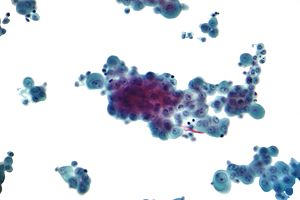 Image via Wikipedia“Is there a cure? No,” says Neil Schachter, MD, medical director of respiratory care and a professor of pulmonary medicine at the Mount Sinai Medical Center in New York City. “There are some promising avenues of research going on now, but mesothelioma is a terrible disease with a poor prognosis, though there are some brighter areas in the field.”
Image via Wikipedia“Is there a cure? No,” says Neil Schachter, MD, medical director of respiratory care and a professor of pulmonary medicine at the Mount Sinai Medical Center in New York City. “There are some promising avenues of research going on now, but mesothelioma is a terrible disease with a poor prognosis, though there are some brighter areas in the field.”Bartolome R. Celli, MD, chief of pulmonary care at St. Elizabeth’s Medical Center in Boston, adds that early detection coupled with surgical intervention can extend patients’ lives. “Unfortunately, there is no real cure,” says Dr. Celli. “Some mesothelioma cases caught early can have extensive resection [surgical removal] of pleura [lung and chest lining] and lung with some survival benefit.”
Malignant pleural mesothelioma is the most common type of mesothelioma. People with this disease generally do not survive a long time; five years after diagnosis, only about 10 percent are still alive.
But there are some options that may bring a ray of hope:
- Direct chemotherapy delivery. Researchers are investigating chemotherapy treatments that are delivered right into the malignant site. Normally, chemotherapy is delivered intravenously.
- New uses for older drugs. Newer mesothelioma treatments also include combinations of older drugs. “People are working on available treatments to see if they can be refined,” says Dr. Schachter.
- Neoadjuvant therapy. With this therapy, chemotherapy, used to shrink a tumor, is given before surgical treatment instead of afterward, which has been the norm.
- Anti-growth factors. These treatments are also designed to cause tumors to shrink, says Schachter. These are being tested in animal models and preliminarily in people to see how toxic they are, “but I don’t think we’re anywhere near being able to use [this treatment method] therapeutically.”
- Biologic therapy or immunotherapy. Another type of therapy being tested is biologic therapy, which can refer to the introduction of a bacterial, viral, or blood product for the treatment of a disease. In mesothelioma, biologics are being used to stimulate a patient’s own immune system to fight the cancer. Other types of biologic treatment attempt to decrease blood flow to the tumor, starving the tumor of what it needs to grow larger and spread.
But at the moment, Schachter says, the only treatment plan that increases life expectancy is surgery first, with chemotherapy and radiation. However, this only applies to a small proportion of the patients diagnosed with mesothelioma, Schachter says. “You have to be strong to undergo that, and then you’re left with only one lung.”

No comments:
Post a Comment